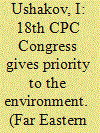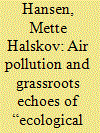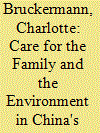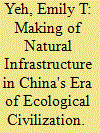|
|
|
Sort Order |
|
|
|
Items / Page
|
|
|
|
|
|
|
| Srl | Item |
| 1 |
ID:
124997


|
|
|
|
|
| Publication |
2013.
|
| Summary/Abstract |
The author gives a close-up view of the environment in China and looks at the reasons that impelled the country's leadership to put the environment on the list of key issues for discussion at the 18th CPC Congress. He also surveys where accents are placed in environment-related congress documents.
|
|
|
|
|
|
|
|
|
|
|
|
|
|
|
|
| 2 |
ID:
159836


|
|
|
|
|
| Summary/Abstract |
This article places the study of rural environmental activism in the wider context of the Chinese government's promotion of Ecological Civilization (shengtai wenming 生态文明). Ecological Civilization is, we argue, a top-down imaginary of China's future that opens up space for environmental agency while setting authoritative standards for how to frame protests in a logic of science and social stability. The article compares how residents in a small cluster of villages in Zhejiang province dealt with different sources of air pollution over a span of ten years: how, when and why they chose to negotiate with local officials and industrial managers to prevent or reduce air pollution, and what the outcome was. We found that in addition to a consciousness of the right to protest, villagers had come to regard the ability to evoke science in negotiations with officials and industrial managers as crucial for success. We suggest that the forms of environmental activism we observed were in effect “containable protests” that befit the state-initiated national imaginary of an ecologically civilized world.
|
|
|
|
|
|
|
|
|
|
|
|
|
|
|
|
| 3 |
ID:
192178


|
|
|
|
|
| Summary/Abstract |
In the “coal province” of Shanxi, residents grapple with tensions between caring for their families and caring about their environment. In creating ethical pathways through care, residents must navigate the paradox of livelihoods dependent on forms of development that endanger lives and pollute environments. This dilemma has crystallized over time, as the personal and particular demands of the present have become enmeshed with long-standing concerns over environmental degradation. Rather than characterizing family care as concrete and environmental care as abstract, acts of care in Shanxi link the reproductive crisis of the family with the reproductive crisis of the environment: the article presents instances under which the attention, empathy and recognition of care for concrete others are scaled up to the levels of ecology and planetary crisis.
|
|
|
|
|
|
|
|
|
|
|
|
|
|
|
|
| 4 |
ID:
195092


|
|
|
|
|
| Summary/Abstract |
China has endorsed the idea of ‘ecological civilization’ for over a decade. How has the Chinese making of the ecological civilization imaginary informed and been affected by on-ground practices? Inspired by insights into anticipatory politics, this study disentangles an officially intended ecological civilization pilot—the ‘Great Yangtze River Protection Programme’ (GYRPP)—to examine the interplay of China’s ecological civilization imaginary, specific policies, and on-ground practices of environmental governance. Informed by fieldwork and documents of GYRPP, this study argues, first, the Chinese state has constructed the ecological civilization imaginary through rendering a concerted future of environmental protection and socio-economic development, which inherently strengthens the regime’s legitimacy. Second, the ecological civilization imaginary has informed a set of policies and been used to coordinate specific local practices. Finally, people, institutions, and other resources are mobilized to serve multiple but sometimes conflicting goals, which in turn reconstitutes the ecological civilization imaginary.
|
|
|
|
|
|
|
|
|
|
|
|
|
|
|
|
| 5 |
ID:
192623


|
|
|
|
|
| Summary/Abstract |
Campaign-style environmental enforcement that involves the destruction of infrastructure has become increasingly common. Scholars have theorized such crackdowns as a form of bureaucratic control. These explanations are compelling, yet incomplete. This paper adopts an infrastructural lens to call attention to the fact of infrastructural demolition. I argue that the reduction of existing infrastructure to rubble is a way of clearing space for other kinds of infrastructure, specifically natural infrastructure, which has become central in the pursuit of ecological civilization. The creation of natural infrastructure requires calculative tools, which work to obscure the profoundly political nature of the natural infrastructure that they create through spatial zoning, ecological functional zoning and ecological conservation red lines (ECRLs). The article then scales down to two case studies of villages in post-earthquake Sichuan that are within ECRLs and designated for the function of providing ecosystem services. In both, infrastructure within scenic areas that was previously encouraged by the state and central to village livelihoods was suddenly destroyed following ecological civilization enforcement campaigns. The arrival of natural infrastructure marks a national-scale infrastructural time that promises a new future in which village-controlled scenic areas have no part, leading to a ruination of their imagined futures.
|
|
|
|
|
|
|
|
|
|
|
|
|
|
|
|
| 6 |
ID:
194027


|
|
|
|
|
| Summary/Abstract |
This paper examines the concept of green nationalism in the authoritarian context of China, where the ruling Chinese Communist Party (CCP) has adopted the rhetoric of ecological civilization as a means of promoting environmental protection and securing global legitimacy. The authors argue that the CCP's performance legitimacy is closely linked to its ability to address environmental concerns in the context of climate change, and that the development of green nationalism is a rational choice for leaders seeking to maintain this legitimacy. However, the authors also highlight the role of actors such as social entrepreneurs, academics, and environmental NGOs in promoting green nationalism from the bottom-up. Using constructivist political theory, the paper explores how the intersection of different green narratives at various levels can be used to rethink the nation and make claims to legitimacy. Overall, the paper contributes to theory-building by providing a framework for understanding the complex relationship between environmental protection, nationalism, and authoritarian politics in China.
|
|
|
|
|
|
|
|
|
|
|
|
|
|
|
|
| 7 |
ID:
195090


|
|
|
|
|
| Summary/Abstract |
China’s Green Shield Action (GSA) campaign provides critical insights into the nature of environmental politics during a campaign-style inspection under an authoritarian regime. Based on fieldwork in Fujian from 2019 to 2022, the dynamic interactions among stakeholders, the role of campaigns in environmental governance, and the logic behind policy formulation, implementation, and revision were explored. This study finds that in the campaign-style inspection, by applying new technology and improved management, less room was left for local governments to make trade-offs and dilemmas, which further caused high political pressure and conflicts. These outcomes were used as a reference for the central government to adjust its policies and implement regular enforcement with an improved environmental governance system. The campaign-style enforcement is not the opposite of regular enforcement, but these two are closely connected in the case of the GSA.
|
|
|
|
|
|
|
|
|
|
|
|
|
|
|
|
|
|
|
|
|